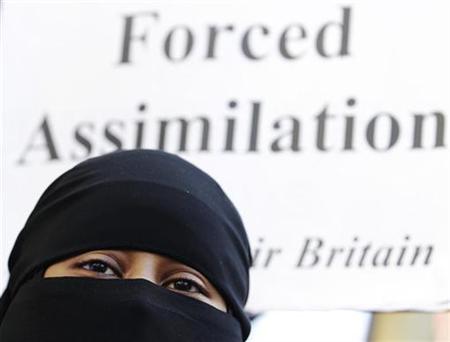PARIS, (Reuters) – First the French banned Muslim face veils, now the Dutch have decided to follow suit. With debates about outlawing burqas and niqabs spreading across Europe, a third ban — perhaps even more — may not be far behind.
Only a small minority of Muslim women in Europe cover their faces, but their veils have become ominous symbols for Europeans troubled by problems such as the economic crisis, immigration and Muslim integration.
With Europe’s political mood moving to the right, low-cost, high-symbolism measures such as veil bans have become a rallying cry for far-right parties knocking at the door of power.

Their appeal also resonates with those worried by possible security threats from masked people or offended by the blow to gender equality they see when a covered woman walks by.
Raffaele Simone, whose book “The Meek Monster: why the West is not going left” has aroused debate in Italy and France, said the rightward drift fits an individualistic and globalised consumer society that Europe’s left-wing failed to understand. “In ageing European populations, modernity has generated a worrying and chaotic jumble of threats and fears only the right and the far right seem able to respond to now,” Simone, a Rome university professor, told the Paris newspaper Le Monde.
Calls for a “burqa ban” are now heard across Europe, with local politics influencing how close it gets to becoming law.
Two centre-right Dutch parties agreed on Thursday to ban burqas and niqabs in public places as the price of support for their minority government from the far-right Freedom Party keen to stop what it calls the Islamisation of the Netherlands. The deal with the populist leader Geert Wilders will also tighten rules on immigration.
Echoing protests heard in France, a Dutch Muslim leader said the ban was a vast overreaction. “We don’t even have 100 people who wear a burqa,” said Yusuf Altuntas of the Muslim group CMO.
The anti-immigration Sweden Democrats, whose videos for last week’s election showed a veiled woman overtaking a pensioner in a rush to collect welfare cheques, now hold the balance of power between the centre right government and the opposition.
Prime Minister Fredrik Reinfeldt does not support a complete veil ban but Education Minister Jan Bjorklund believes schools and universities should be allowed to prohibit them.
Three days after Paris passed its ban last month, Italian Prime Minister Silvio Berlusconi’s populist Northern League allies introduced a similar bill in Rome. Another Berlusconi ally submitted a draft ban law in the Senate last week.
Avvenire, the newspaper of Italy’s Catholic Church, has applauded the French ban and said wearing veils was not Islamic dogma but “an identity symbol of an ideological character”. The parliament in Socialist-governed Spain rejected a motion by the conservative opposition in July to consider a national ban on face veils in public places. However, local bans have popped up. Barcelona outlawed burqas and niqabs in public buildings in June, after two smaller Catalan towns, Lerida and El Vendrell, banned them early this year.
DEBATE GOES ON
Belgium’s lower house of parliament approved a veil ban in April but the government collapsed before the Senate debated it. The issue is now waiting for the next government to be formed.
In Switzerland, the two right-wing parties behind last year’s unexpectedly successful referendum banning minarets have urged several cantons to submit a draft veil ban in the federal parliament. None have done so yet and the debate continues.





